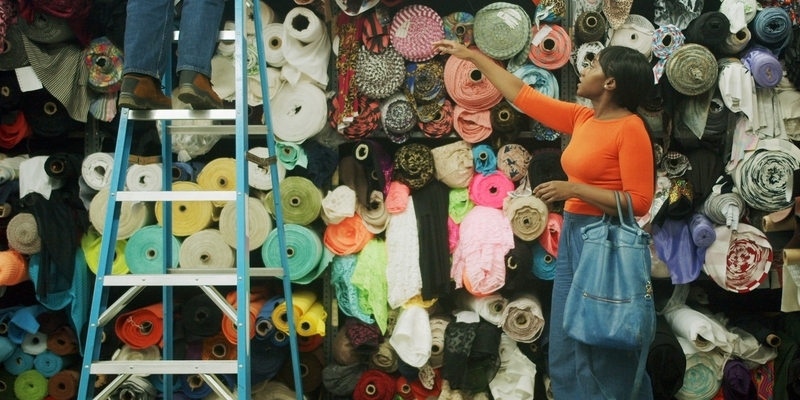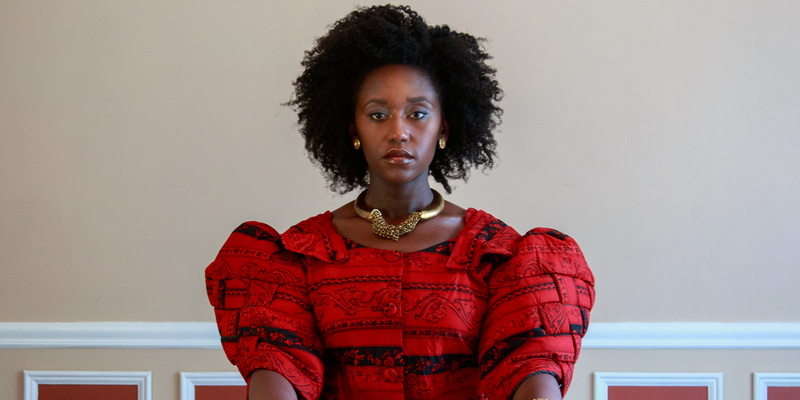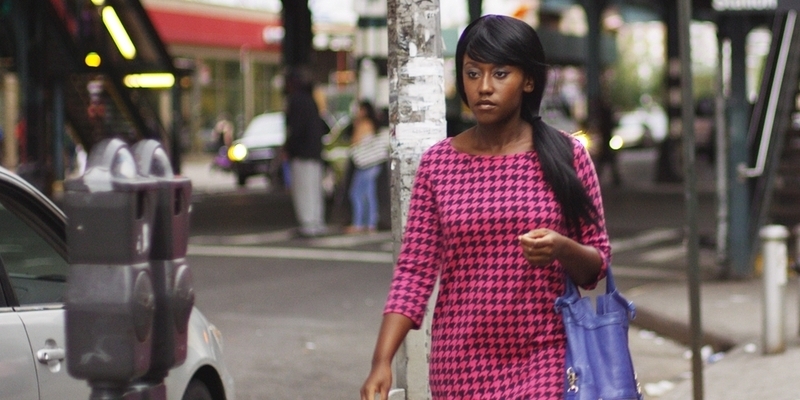
When her mother dies, a scientist reconnects with her estranged father
and her Ghanian immigrant community.
Review by
Benjamin Poole
Directed by: Nana Mensah
Starring: Nana Mensah, Meeko Gattuso, Oberon K.A. Adjepong, Adam Leon, Russell G. Jones, Anya
Migdal

What an absolute delight of a film is Nana Mensah’s
Queen of Glory. The gentle comedy drama, which the filmmaker wrote, directed, stars in,
and self-funded via Kickstarter, is a coming of middle-age narrative which
focuses on Sarah (Mensah), a Ghanian/American medical post-grad at a
crossroads in her life. Sarah is having a long-term affair with a senior
lecturer and is waiting on him to inform his wife so she finally can up
sticks from the Big Apple and shift off to Ohio with him, where her beau
has been offered tenure. Things are promising: even though it is implied
that her fella (Lyle, played by Adam Leon) wants to keep the tryst
on the downlow with the relationship subsequently limited to apartment
based booty calls, Sarah otherwise seems to be thriving in her role in the
Ivy League oncology department, she also has strong links with the Ghanian
community and extended family, and it even looks as if she has interest in
someone buying the flat. As ever, life has other plans though, which
become urgently apparent when Sarah, post-illicit shag, receives a phone
call advising her that her mom has suddenly died.

This unwelcome news doesn’t come alone: it falls to Sarah to arrange her
mother’s funeral, which, according to Ghanian tradition is a
multi-faceted, prolonged, near-festival of an event; along with dealing
with the Christian bookshop which her mother used to run in the Bronx.
Looks like Ohio, and Sarah’s blossoming career in medicine is going to
have to be put on hold for the foreseeable. Instead, we wonder if Sarah is
going to learn one or two things about the importance of her roots and the
palliative powers of community...
A cute running joke in Queen of Glory involves the
increasing incredulity of other characters when Sarah tells them of her
plans to move to the Buckeye State. No wonder, as
Queen of Glory represents the Bronx in its rude glory, as a
vivid and breathing location, which Mensah and DoP
Cybel Martin capture with an original eye (that third dimension of
a city which is only apparent to people who really know it). A strong
conduit of the local flavour which Queen of Glory trades on
is Meeko Gattuso’s (Pitt) impressive presence. The actor,
recognisable from Euphoria, has had a colourful past himself, which is borne out by the intricate
facial tattoos Gattuso sports. Unlike his intimidating role of Mouse in
Euphoria however, here Mensah utilises Gattuso’s enormous
heart and instinctive chemistry. Which means that Pitt’s diehard loyalty
for Sarah’s mother, and his absolute reliance on the bookshop as a place
of employment following his incarceration and shady past, is a further
complication for Sarah’s plans...

Post useless Lyle, Pitt is at least a positive and dependable presence in
Sarah’s life. It takes a massive suspension of disbelief to accept that
Sarah (who is clever, funny, and there is no other way of saying this,
utterly beautiful) would knock about with Lyle, a man who wears sneakers
with a suit, for the love of Mick. Is it implied that she has low
self-esteem? Certainly, she doesn’t seem to have friends who she can share
her trauma with, and when her feckless father returns from Ghana for the
funeral, she directly falls into the role of carer for him: he is
incapable of even finding and operating the television remote control
without screaming to his daughter for help.
As the film goes on, the tender and organic manner in which Sarah builds
relationships with her new community via the bookshop is genuinely
heart-warming and convincing due to the legitimate and funny performances
Mensah elicits. The refreshed social context of Sarah challenges her
loneliness and gives her a renewed sense of purpose, built on kindness,
honour and mutual respect. It is rather satisfying that Sarah’s
actualisation is not linked to bagging a man, or, indeed, having children
(the film pointedly contrasts Sarah’s life with that of her next-door
neighbours’, whose domicile of three kids is a cheerful nightmare).

That said, I did have issues with the ending of the film, which appear as
spoilers henceforth:[SPOILER] All
throughout Queen of Glory I was wondering how Sarah was
going to square her new responsibilities to her mother’s friends and
community with her massively important future career as a cancer
researcher, and how she was going to kick her father into touch, and
properly move on from that idiot she was seeing: so it was hugely
disappointing to see the character turn her back on her entire life to
work forever in the bookshop and seemingly take care of her man-child
father for the rest of her days, as if falling into the patterns expected
of her by cultural tradition (and, yes, Todorovian structures) is a
positive thing, and a happy ending. I dunno. I mean, the conclusions we
are offered don’t detract from the otherwise soothing wonders of
Queen of Glory, but I couldn’t help thinking what a waste. Still, it’s Mensah’s film,
not mine [SPOILER ENDS].
It's been a while since we’ve seen an indie with such natural
characterisation and absorbing sense of place: nothing seems forced here,
or calculated. A warm hug of a film, and a hugely impressive debut
feature. Queen of Glory is worth seeking out for its
compassion, deft comic subtlety and the potential emergence of a major new
talent in Nana Mensah.

Queen of Glory is on Prime Video UK now.
